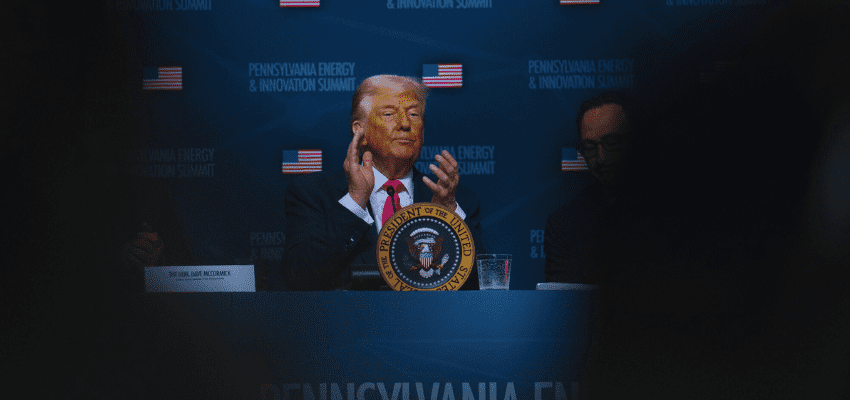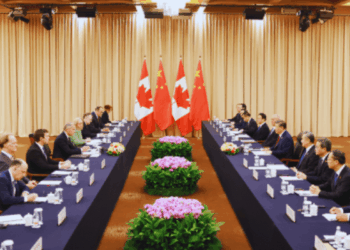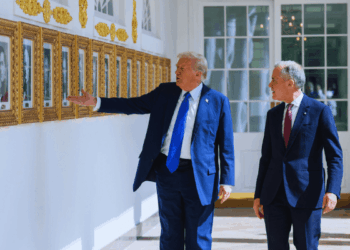This article originally appeared in the Washington Examiner.
By Daniel Dorman, July 18, 2025
The direct effects of President Donald Trump’s tariffs on Canada are well known: the North American economy will suffer on both sides of the border, deeply integrated and productive industries such as energy and autos will be upended, and America will thwart its ambitions to bring about a manufacturing renaissance by cutting off the primary inputs from Canada (steel, lumber, and critical minerals) that would enable such onshoring.
Despite all this, the indirect costs of Trump’s threats may be higher than the direct costs. Trump’s tariffs, because of the real increased cost of doing business with the U.S., as well as the perception that the U.S. is no longer a reliable ally, are driving Canada closer to China.
On July 14, the Globe and Mail, Canada’s most read news outlet, published an op-ed entitled, “Let’s free ourselves of the U.S. and forge closer ties with China.” The piece is so blatantly in line with Chinese narratives about the U.S. that Canadian foreign policy expert and Macdonald-Laurier Institute senior fellow Balkan Devlen quipped, “I was told it reads better in the original Mandarin.”
The narrative of China’s charm offensive is clear throughout the op-ed: Canada is under the thumb of America (i.e., Trump, a much despised figure North of the border), subservient to American interests at the expense of our own, and thus the only path to “economic sovereignty” is to tie ourselves to the Chinese economy.
The narrative continues: Sure, China is a single-party communist country and America is a pluralist democracy like Canada, but is America really all that democratic? And doesn’t Canada trade with Saudi Arabia despite the difference in government structure?
That’s all rubbish, of course.
Canada and the U.S. are the two most similar developed nations in the world, with a long and deep history tying us together, and a geography making trade diversification for Canada difficult at best. Canada’s prosperity and security have been dependent on America’s prosperity and security, and vice versa.
China is a genocidal, authoritarian state that is actively seeking to undermine Canadian elections.
In the simplest possible terms: Despite the Trump-induced tariff row, America is Canada’s historic ally. China is Canada’s enemy.
Earlier this year, former Canadian Ambassador to China David Mulroney wrote: “China is already alive to the opportunity that a Trump-induced crisis offers for re-capturing hearts and minds in the West.” That recapturing is taking place before our eyes, and the effect on Canada’s foreign policy is tangible.
In June, Canadian Prime Minister Mark Carney agreed to regularize communication with the Chinese government and is seeking to remove tariffs on Chinese agricultural products. At the same time, Carney is now signaling that U.S. tariffs may be here to stay. In sum, Carney is regularizing communication and seeking to remove trade barriers with our enemy, while he gives up on reaching a trade deal with our ally.
Some have characterized Trump’s tariff strategy, particularly tariffs on steel and aluminum, as a crackdown on China’s distortion of global markets and growing dominance in global trade. But if this is the case, cutting off Canada, also a key supplier of steel and other primary inputs, is wrong-headed and counterproductive.
As authors at the Center for North American Prosperity and Security explain: “The US-Canada economy also plays a key role in thwarting Chinese aspirations in North America. Canadian inputs displace Chinese inputs, and its critical minerals, metals, and gases are vital for the defense, national security, AI, semiconductor, and green energy industries.”
In other words, Trump’s tariffs on Canada are doubly counterproductive: Not only are these tariffs pushing Canada deeper into a relationship with China, but at the same time, they are also forcing the U.S. economy into continued dependence on China for key resources.
To his credit, on July 16, Carney promised to curb “non- U.S.” cheap steel imports (i.e., Chinese steel to protect Canadian industry from dumping and align with the U.S.). This is the right direction, but much more is needed.
Canadians should demand that Carney see through China’s charm offensive and continue to call out China as a pressing threat to Canadian sovereignty. Americans should call on Trump to recognize the danger of alienating allies in a world shaped by China’s global ambitions.
Daniel Dorman is the managing editor and director of operations at the Macdonald-Laurier Institute in Ottawa and the Center for North American Prosperity and Security in Washington, D.C.








